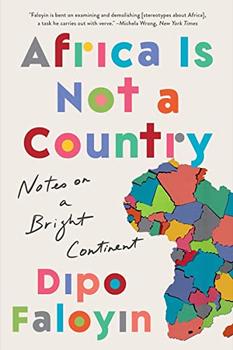Summary | Excerpt | Reviews | Beyond the Book | Readalikes | Genres & Themes | Author Bio

Notes on a Bright Continent
by Dipo Faloyin
Instead, in all our interactions, we leave tiny breadcrumbs as clues to the inner sanctum of our complex identities. It's an unwitting, uneven collaboration between the big things: the genetics we inherit from our parents, and the life decisions we take after careful calculations; the subconscious things – degrees of eye contact, automated anxieties; and the millions of things that thrive in the middle, whether it's checking the weather before stepping outside, the perfect storage place for condiments, a commitment to coordinating socks.
Small patches of persona stitched together until they form someone real.
Not everyone is allowed a complex identity. Throughout history, individuals and entire communities have been systematically stripped of their personhood and idiosyncrasies, often to make them easier to demean, denigrate and subjugate – and, in some cases, eradicate. Being able to define yourself openly and fully is a privilege; it is a grace many take for granted. The ability to walk into a meeting or an interview, or to interact with a police officer, and be given the respect and opportunity to present yourself without pre-judgement, can be life-defining, life-affirming and life-saving.
To strip an individual of that privilege is destructive enough. But when you apply this reductive treatment to an entire community, country or race, you create a poisonously false narrative that permeates for generations, until the fiction becomes fact, which in turn becomes an infected shared wisdom steadily passed down – in schools, at family dinner tables, in words pressed into books, and in the images that populate our popular culture.
Few entities have been forced through this field of distorted reality as many times as Africa – a continent of fifty-four countries, more than two thousand languages, and 1.4 billion people. A region that is treated and spoken of as if it were a single country, devoid of nuance and cursed to be forever plagued by deprivation.
For too long, 'Africa' has been treated as a buzzword for poverty, strife, corruption, civil wars, and large expanses of arid red soil where nothing but misery grows. Or it is presented as one big safari park, where lions and tigers roam freely around our homes and Africans spend their days grouped in warrior tribes, barely clothed, spears palmed, hunting game, and jumping up and down with ritualistic rhythm to pass the time before another aid package gets delivered. Poverty or safari, with nothing in between.
No matter how hard I try to explain that I was raised in a sprawling metropolis with all the twists and tricks of a sprawling metropolis, too many can only imagine what they've been programmed to believe. They cannot picture my mum's primary school, with happy, well-nourished children bursting through the gates every morning, because various international charities have them convinced that to be young in Africa is to be surrounded by flies and fuelled with nothing but contaminated drinking water; that to be African is a daily exercise in barely escaping the clutches of a rotating cast of free-roaming warlords in dirty fatigues, hanging off the back of 4x4 Jeeps that whizz along dirt jungle paths.
In reality, Africa is a rich mosaic of experience, of diverse communities and histories, and not a singular monolith of predetermined destinies. We sound different, laugh differently, craft the mundane in uniquely mundane ways, and our moral compasses do not always point in the same direction.
This book is a portrait of modern Africa that pushes back against harmful stereotypes to tell a more comprehensive story – based on all the humanity that has been brushed aside to accommodate a single vision of blood, strife, and majestic shots of rolling savannahs and large yellow sunsets. It will unspool the inaccurate story of a continent, dragging this bludgeoned narrative towards reality.
Excerpted from Africa Is Not a Country: Notes on a Bright Continent. Copyright (c) 2022 by Dipo Faloyin. Used with permission of the publisher, W. W. Norton & Company, Inc. All rights reserved.
To be ignorant of what occurred before you were born is to remain always a child
Click Here to find out who said this, as well as discovering other famous literary quotes!
Your guide toexceptional books
BookBrowse seeks out and recommends the best in contemporary fiction and nonfiction—books that not only engage and entertain but also deepen our understanding of ourselves and the world around us.